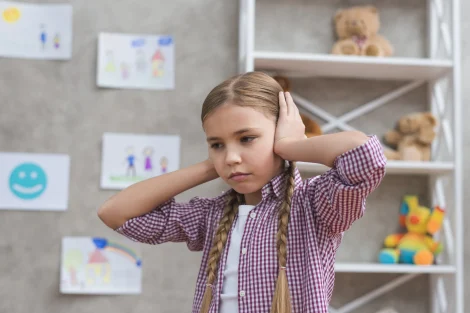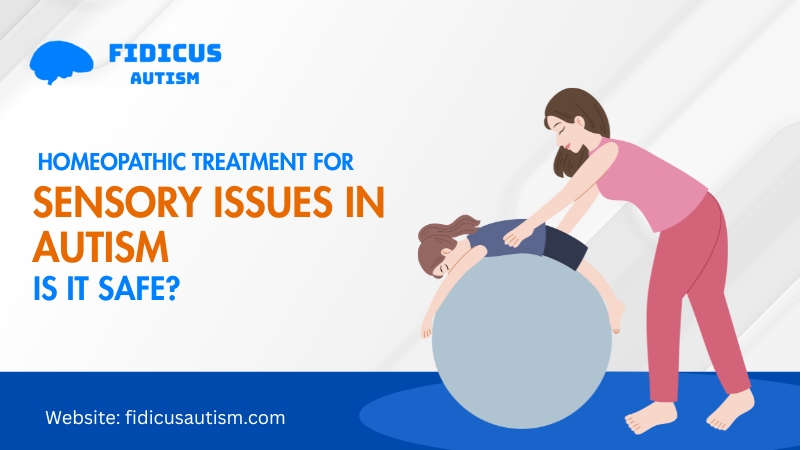Sensory issues are among the most common challenges faced by children with autism, often causing distress and difficulties in handling everyday situations. Bright lights, loud sounds, or even certain textures can trigger discomfort, meltdowns, or withdrawal. Parents are increasingly searching for safe and effective ways to help their children manage these sensitivities and related Behavioural Disorders without the risk of side effects. Homeopathy provides a holistic, natural approach that focuses on treating the root cause rather than masking symptoms.
With carefully selected remedies tailored to each child’s unique sensory profile, homeopathy aims to calm the nervous system, reduce hypersensitivity, and improve emotional and behavioral responses. It is especially helpful in managing challenges like Hyperactivity in Autism, where children often struggle with restlessness and difficulty focusing. Unlike conventional methods that may rely on medications or therapies with side effects, homeopathy is gentle, non-invasive, and suitable for long-term use. For parents wondering whether it is safe, homeopathy stands out as a supportive, side-effect-free treatment option that helps children with autism live more balanced and comfortable lives.
What are Sensory Issues in Autism?
To put it simply, sensory issues in autism arise when the brain processes sensory input in an unusual way. Instead of filtering and balancing information from the senses (sight, sound, touch, taste, smell, and movement), the brain may either overreact (hypersensitive) or underreact (hyposensitive).
- A hypersensitive child may find even normal sounds painful.
- A hyposensitive child may not react to pain or may constantly seek movement.
- Most children show a mix of both patterns.
Understanding what sensory issues in autism helps parents realize that these behaviours are not intentional but are the child’s way of coping with overwhelming sensory input.

sensory issues autismFidicus Autism specializes in homeopathy treatment for autism and sensory issues with a child-centered approach:
- Expertise in handling a wide range of sensory concerns.
- Personalized care for each child.
- Safe remedies with no side effects.
- Guidance and regular follow-up for parents.
Our goal is not only symptom relief but also helping children adapt better to their surroundings and live more comfortably.
Common Sensory Issues Symptoms
Parents usually notice sensory issues symptoms early in life. Some of the most common signs include:
- Covering ears or crying everyday sounds like a mixer, vacuum, or school bell.
- Refusing certain clothing materials because of scratchy seams or textures.
- Eating only a limited variety of foods due to taste, smell, or texture sensitivity.
- Avoiding bright lights, crowded rooms, or sudden movements.
- Excessive fascination with spinning, jumping, or rocking.
- Frequent meltdowns or withdrawal when sensory input becomes too much.
These sensory issues symptoms affect not only daily comfort but also learning, social interaction, and emotional well-being.
Sensory Issues Autism Examples in Daily Life
To make it clearer, here are some sensory issues autism examples:
- A child who refuses to wear shoes because the feeling of laces feels unbearable.
- A toddler who screams when taken to a birthday party due to balloons popping and loud clapping.
- A teenager who eats only white-coloured foods like rice or bread because mixed textures cause distress.
- A child who constantly spins in circles to satisfy an under-responsive sense of balance.
These sensory issues autism examples show that every child has a unique sensory pattern, and support must be personalized.

Why Sensory Issues Need Attention?
If ignored, sensory issues in autism can grow more intense over time and affect almost every part of a child’s daily life:
- Frequent Meltdowns and Anxiety: Overwhelming sensory input, like loud sounds or bright lights, can lead to sudden outbursts, restlessness, or withdrawal.
- Reduced Participation in School and Social Activities: Children may avoid classrooms, playgrounds, or family gatherings because the environment feels too uncomfortable.
- Sleep and Eating Habits Affected: Many children with sensory issues autism struggle with picky eating, limited food choices, or disturbed sleep due to light, sound, or tactile sensitivities.
- Misunderstandings in Behaviour: Parents, teachers, or peers may misinterpret these reactions as stubbornness or disobedience, when in reality they are signs of sensory issues symptoms.
- Impact on Learning and Confidence: When sensory overload is constant, it becomes harder for children to focus, learn, and express themselves confidently.
This is why early recognition and safe, individualized care are so important. Addressing these concerns through natural solutions like homeopathy treatment for sensory issues in autism can ease discomfort, reduce emotional stress, and significantly improve a child’s overall quality of life.

Homeopathy for Sensory Issues in Autism
Unlike conventional medicine, which may only manage symptoms temporarily, homeopathy treatment for sensory issues in autism takes a holistic approach:
- Individualized Remedies: Medicines are prescribed based on the child’s complete personality, triggers, emotional state, and physical health.
- Gentle & Safe: Homeopathic medicines are highly diluted, ensuring they are free from side effects and safe even for young children.
- Root-Level Action: Instead of suppressing symptoms, remedies aim to balance the child’s sensory processing and overall system.
- Gradual Improvement: Parents often report reduced intensity of reactions, better calmness, improved sleep, and more tolerance to sensory triggers over time.
At Fidicus Autism, each child is evaluated in detail so that remedies match their unique sensory profile.
Is Homeopathy Safe for Sensory Issues in Autism?
Safety is one of the biggest concerns for parents. Here’s why homeopathy is safe for sensory issues in autism:
- Medicines are non-toxic, non-addictive, and free from chemical side effects.
- They do not interfere with a child’s natural growth and development.
- Remedies are customized, so there is no “one-size-fits-all” approach.
- Unlike strong medications, homeopathy does not cause drowsiness, dependency, or long-term harm.
This makes homeopathy a trusted option for families seeking natural care.
How to Reduce Sensory Issues in Autism with Homeopathy?
Parents often ask: how to reduce sensory issues in autism naturally? With homeopathy, the process is systematic:
- Detailed Case History: Every small detail — from food preferences to triggers — is recorded.
- Selection of Remedies: Medicines are prescribed according to sensory sensitivities (sound, light, touch, taste, smell, or movement).
- Observation of Progress: Changes are tracked — like less distress in noisy places or improved tolerance to clothing textures.
- Holistic Benefits: Along with sensory relief, parents often notice improvements in behaviour, sleep, digestion, and mood.
The result is not just reduced sensory discomfort but an overall better balance in the child’s life.

Practical Support Alongside Homeopathy
While remedies form the foundation, a few small lifestyle changes help parents manage sensory challenges more smoothly:
- Use comfortable, soft clothing to avoid tactile triggers.
- Maintain a calm, clutter-free home environment.
- Respect food sensitivities — gradually introduce variety without force.
- Provide predictable routines, as unexpected changes increase stress.
These steps, when paired with homeopathy treatment for sensory issues in autism, give children a safer and more supportive environment.
Why Choose Fidicus Autism?
Fidicus Autism specializes in homeopathy treatment for autism and sensory issues with a child-centered approach:
- Expertise in handling a wide range of sensory concerns.
- Personalized care for each child.
- Safe remedies with no side effects.
- Guidance and regular follow-up for parents.
Our goal is not only symptom relief but also helping children adapt better to their surroundings and live more comfortably.
Final Thought
Sensory Issues in Autism are very common and can deeply affect a child’s learning, social interactions, and emotional well-being. By identifying sensory issues symptoms early, understanding real-life sensory issues, autism examples, and exploring the best treatments for autism, parents can take the right steps to support their child. Unlike conventional methods that only manage outward behavior, homeopathy treatment for sensory issues in autism works in a safe, natural, and holistic way—addressing the root cause rather than simply suppressing symptoms. At Fidicus Autism, we are dedicated to guiding families with compassionate, personalized homeopathic care that helps children live more balanced and comfortable lives.





